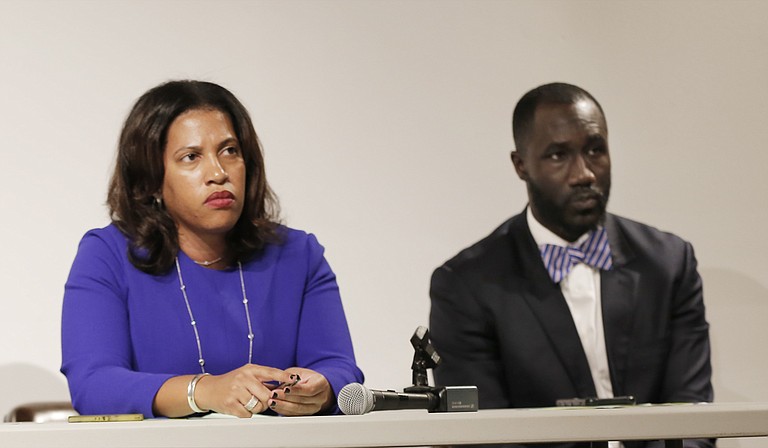City of Jackson Public Works Director Kishia Powell (left) and Mayor Tony Yarber (right) answered questions from the public about exorbitant water bills at a town hall meeting on Nov. 16. Photo by Imani Khayyam.
Tuesday, November 17, 2015
For a while, if you called the City of Jackson to inquire about an unusually high water bill, a call-center representative would read off a script of possible reasons for the spike—it might be the effect of a 2014 water- and sewer-rate increase, a leak on your property or a meter calibrated to read gallons instead of cubic feet—then take down your information and promise to get back to you.
After more careful review, city officials say that while those remain potential causes of exorbitant water bills, the problems go a little deeper and are more complicated than that.
At a town hall meeting at the Smith Robertson Museum on Nov. 16, Mayor Tony Yarber and Kishia Powell, the director of public works, explained the technical glitches in a new billing system and answered questions from the public about their billing issues.
Yarber began the program by saying that his own mother received a water bill of approximately $1,000 and assured the standing-room-only crowd that the City empathizes with water customers.
"We are not looking to turn off folks' water because the City is having issues," Yarber told the audience.
The new customer care and billing system is intended, information from the City states, to provide "increased efficiency of meter reading and water billing, eventual elimination of the need for estimated bills and a reduced need for personnel to enter property." It is part of the $91 million Siemens contract to replace old water meters with new meters with electronic-reading capability. The billing software represented $11.3 million of the overall Siemens contract, documents show.
The transition, which began Sept. 1, involved going from issuing water bills every other month to sending out monthly bills. Powell explained that the switchover meant that for a few months, the City would need to estimate water bills using a formula based on past consumption.
"The billing system has not really been able to work with that formula," Powell said, adding that in some cases, the billing software estimated two months of usage for a one-month billing period.
As of Friday, Nov. 13, Powell said the City had 11,000 water bills "hung up" in the system and, therefore, required manual adjustments.
The explanations did little to quell the frustration of some people who attended the town hall, however.
Jo Ann Manogin told city officials she lives alone and works during the day but received a $214 water bill for one month of usage. However, the bill increased to $267 with late fees, as she has sought answers from the Water Sewer Business Administration, which oversees billing.
"If I can't pay $214, how am I going to pay $267 then?" Manogin snapped at Powell.
During and after the meeting, people with specific billing issues were able to speak directly with Powell or members of Yarber's staff.
James Covington, whose iVision IT Consultants is the subcontractor responsible for the billing system under the Siemens agreement, attended the town hall but declined an interview with the Jackson Free Press.
Amanda Naiman, a spokeswoman for Siemens, told the Jackson Free Press in a emailed statement: "While it is not unusual when implementing this type of system upgrade to go through a transitionary period when bills are estimated, there have been some challenges, including missing or inaccurate data from the old billing system."
Siemens, she said, is working with the City to "adjust the estimation process as needed to ensure as smooth of a transition as possible."
"Once the system is fully verified and implementation is complete, bills will be based on actual meter reads/consumption each month. After the transitionary period concludes, the bills will only be estimated if a read cannot be reasonably obtained," Naiman said.
After the town hall, Yarber told the JFP that water-bill estimates were intended to go on for just two or three billing cycles, but it is likely to take longer.
"We're having to do some about-facing and assess where we are and plot a different path," Yarber said.

Comments
Use the comment form below to begin a discussion about this content.
Sign in to comment
Or login with:
OpenID